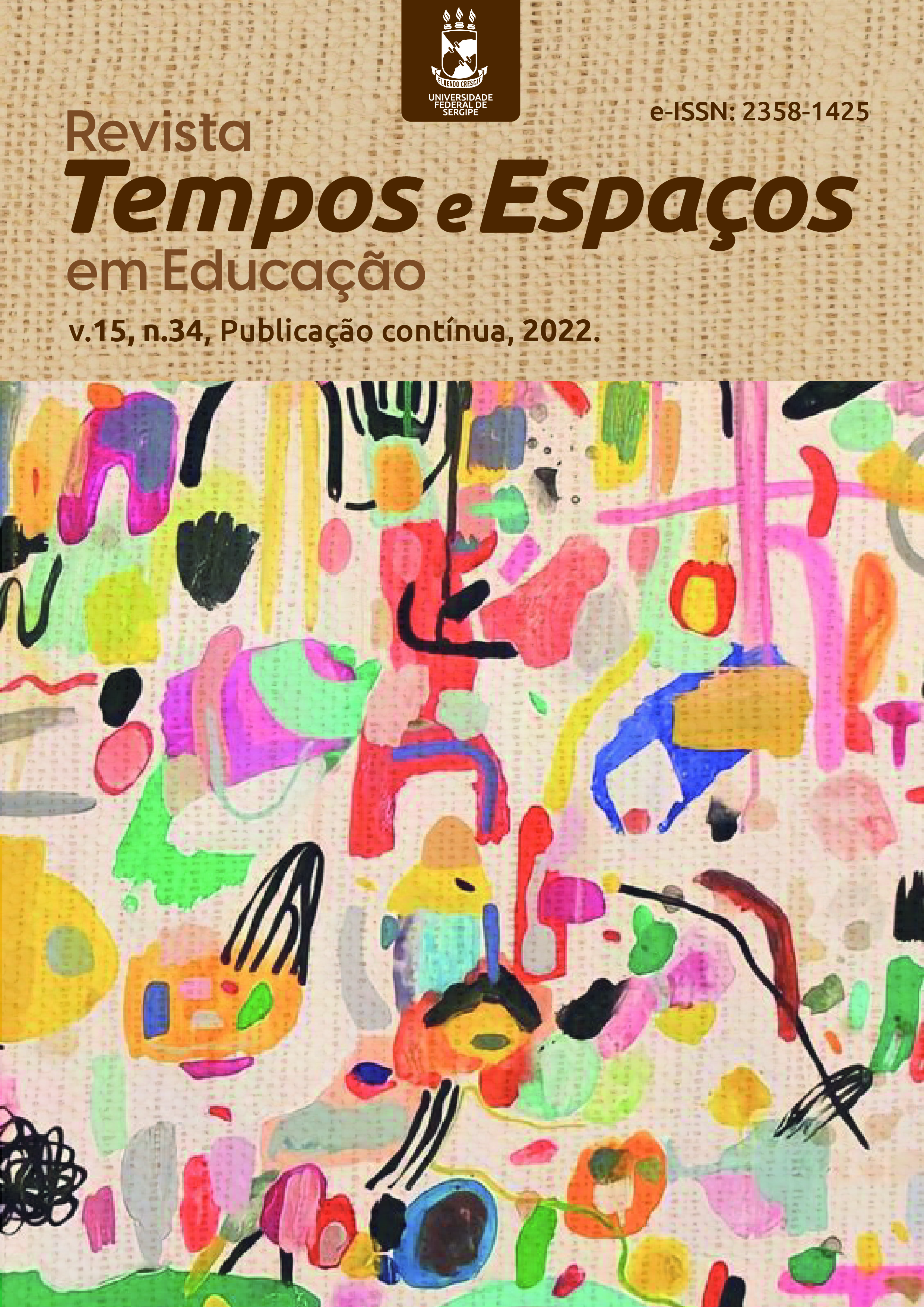Los principales aspectos de la docencia en el contexto del desarrollo del ambiente educativo y la cultura en las universidades
DOI:
https://doi.org/10.20952/revtee.v15i34.17256Palabras clave:
pedagogía, ambiente y cultura educativa, universidades, docente, futuros especialistas, aprendizaje en línea, tecnologías de la información y la comunicaciónResumen
El objetivo principal del artículo es estudiar los principales aspectos de la docencia en el contexto del desarrollo del entorno y la cultura educativa en las universidades. En todo momento y en todas las tradiciones culturales, hubo un respeto especial por el maestro. Después de todo, un maestro no es solo un portador y distribuidor de conocimiento, sino también un educador de valores y pautas morales en la vida de una persona. Así, se puede decir que un maestro/educador/ es una especie de “educador del alma” de una persona. En este sentido, el papel del docente es clave en el proceso de organización del entorno y la cultura educativa en la universidad. Para ello se utilizaron métodos teóricos generales y específicos de investigación teórica de las fuentes literarias más avanzadas. Además, se realizó una encuesta entre estudiantes de una institución de educación superior sobre el papel que juega un docente en el proceso de organización del ambiente y la cultura educativa en la universidad. Como resultado del estudio se analizaron y sistematizaron los principales aspectos de la docencia en el contexto del desarrollo del ambiente y la cultura educativa en las universidades
Descargas
Citas
Abadzi, H. (2015), “Training the 21st-century Worker: Policy Advice from the Dark Network of Implicit Memory”, IBE Working Papers on Curriculum Issues, Vol. 16, http://unesdoc.unesco.org/images/0023/002355/235521e.pdf
Amin, F. M., & Sundari, H. (2020). EFL students’ preferences ondigital platforms during emergency remote teaching: Video Conference, LMS, or Messenger Application?. Studies in English Language and Education, 7(2), 362-378
Bakanova I.G., Javorcikova J.(2020) Features of e-learning organization in a Modern University // Vestnik of Samara State Technical University Psychological and Pedagogical Sciences. 17. 4. 5-15. doi: 10.17673/vsgtu-pps.2020.4.1
Cheng, S.-L., Lu, L., Xie, K., & Vongkulluksn, V. W. (2020). Understanding teacher technology integration from expectancy-value perspectives. Teaching and Teacher Education, 91, 103062. https://doi.org/10.1016/j.tate.2020.103062
Crawford, J. Butler-Henderson, K. Rudolph, J. Malkawi, B. Glowatz, M. Burton, R., Magni, P., Lam, S. (2020) COVID-19: 20 countries’ higher education intra-period digital pedagogy responses. J. Appl. Learn. Teach.,3, 1–20.
Dhawan, S. (2020). Online learning: A panacea in the time of COVID-19 crisis. Journal of Educational Technology Systems, 49(1), 5–22. https://doi.org/10.1177/0047239520934018
Ertmer, P. A., & Otternbreit-Leftwich, A. T. (2019). Teacher technology change: How knowledge, confidence, beliefs, and culture intersect. Journal of Research on Technology in Education, 42, 255-284. https://doi.org/10.1080/15391523.2010.10782551
Foray, D. and J. Raffo (2012), “Business-Driven Innovation: Is it Making a Difference in Education?: An Analysis of Educational Patents”, OECD Education Working Papers, No. 84, OECD Publishing, Paris, http://dx.doi.org/10.1787/5k91dl7pc835-en.
Geng, S., Law, K., & Niu, B. (2019). Investigating self-directed learning and technology readiness in blending learning environment. International Journal of Educational Technology in Higher Education, 16. https://doi.org/10.1186/s41239-019-0147-0
Kapustina L.V.(2021) Digital footprint analysis to develop a personal digital competency-based profile. In: Ashmarina S., Mantulenko V. (eds.) Current Achievements, Challenges and Digital Chances of Knowledge Based Economy. Lecture Notes in Networks and Systems. 2021. Vol. 133. Рр. 591–596. Springer, Cham. https://doi.org/10.1007/978-3-030-47458-4_68
Kryshtanovych, M., Kryshtanovych, S., Stechkevych, O., Ivanytska, O., & Huzii, I. (2020). Prospects for the Development of Inclusive Education using Scientific and Mentoring Methodsunder the Conditions of Post-Pandemic Society. Postmodern Openings, Vol.11. No.2, 73-88. https://doi.org/10.18662/po/11.2/160
Kryshtanovych, M., Romanova, A., Koval, I., Lesko, N., & Lukashevska, U. (2021). Research of problems and prospects of state development in the pedagogical process. Revista Tempos E Espaços Em Educação, 14(33), e16534. https://doi.org/10.20952/revtee.v14i33.16534
Lee, Y., Hsiao, C., & Ho, C. H. (2014). The effects of various multimedia instructional materials on students‟ learning responses and outcomes: A comparative experimental study. Computers in Human Behavior, 40, 119-132. https://doi.org/10.1016/j.chb.2014.07.041
Levitt, H. M. (2018). How to conduct a qualitative meta-analysis: Tailoring methods to enhance methodological integrity. Review PMID, 28(3), 367-378. https://doi.org/10.1080/10503307.2018.1447708
Marks, G. (2014), Education, social background and cognitive ability, Routledge, https://www.routledge.com/Education-Social-Background-and-Cognitive-Ability-The-decline-ofthe/Marks/p/book/9780415842464
Moorhouse, B. L. (2020). Adaptations to a face-to-face initial teacher education course ‘forced’online due to the COVID-19 pandemic. Journal of Education for Teaching, 46(4), 609-611
Naylor, D., & Nyanjom, J. (2020). Educators’ emotions involved in the transition to online teaching in higher education (pp. 1–15). Higher Education Research & Development. https://doi.org/10.1080/07294360.2020.1811645
Rapanta, C., Botturi, L., Goodyear, P., Gu`ardia, L., & Koole, M. (2020). Online university teaching during and after the covid-19 crisis: Refocusing teacher presence and learning activity. Postdigital Science and Education. https://doi.org/10.1007/s42438-020-00155-y
Descargas
Publicado
Cómo citar
Número
Sección
Licencia
À Revista Tempos e Espaços em Educação ficam reservados os direitos autorais pertinentes a todos os artigos nela publicados. A Revista Tempos e Espaços em Educação utiliza a licença https://creativecommons.org/licenses/by/4.0/ (CC BY), que permite o compartilhamento do artigo com o reconhecimento da autoria.



